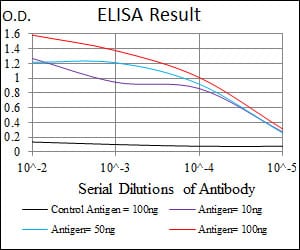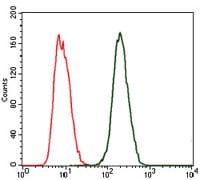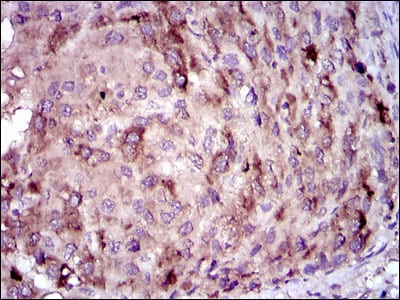


| WB | 咨询技术 | Human,Mouse,Rat |
| IF | 咨询技术 | Human,Mouse,Rat |
| IHC | 1/50-1/200 | Human,Mouse,Rat |
| ICC | 技术咨询 | Human,Mouse,Rat |
| FCM | 咨询技术 | Human,Mouse,Rat |
| Elisa | 1/5000-1/10000 | Human,Mouse,Rat |
| Aliases | PTX1 |
| Entrez GeneID | 1401 |
| clone | 1G1 |
| WB Predicted band size | 25kDa |
| Host/Isotype | Mouse IgG1 |
| Antibody Type | Primary antibody |
| Storage | Store at 4°C short term. Aliquot and store at -20°C long term. Avoid freeze/thaw cycles. |
| Species Reactivity | Human |
| Immunogen | Purified recombinant fragment of human CRP expressed in E. Coli. |
| Formulation | Ascitic fluid containing 0.03% sodium azide. |
+ +
以下是关于TUFM(线粒体翻译延长因子Tu)抗体的3篇参考文献及其简要概括:
1. **文献名称**:*Mitochondrial translation elongation factor Tu is a potential biomarker and therapeutic target for colorectal cancer*
**作者**:Li, X., et al.
**摘要**:本研究通过免疫组化(使用TUFM抗体)发现结直肠癌组织中TUFM蛋白显著高表达,并与患者预后不良相关。实验进一步验证TUFM通过调节线粒体代谢促进肿瘤生长。
2. **文献名称**:*TUFM interacts with antiviral signaling proteins to enhance the innate immune response*
**作者**:Zhang, Y., et al.
**摘要**:利用TUFM特异性抗体进行免疫共沉淀(Co-IP)和Western blot分析,发现TUFM与RIG-I信号通路相互作用,增强抗病毒天然免疫应答,为病毒感染机制提供新视角。
3. **文献名称**:*Dysregulation of mitochondrial translation in Parkinson's disease models*
**作者**:Wang, H., et al.
**摘要**:通过TUFM抗体检测帕金森病模型小鼠脑组织,发现TUFM表达降低导致线粒体蛋白合成障碍,可能与多巴胺能神经元退行性变相关,提示其在神经疾病中的潜在作用。
以上研究均通过TUFM抗体明确检测蛋白表达或功能,涵盖癌症、免疫及神经疾病领域。
**Background of TUFM Antibody**
The mitochondrial translation elongation factor Tu (TUFM) is a key protein involved in mitochondrial protein synthesis, functioning as a GTPase that facilitates the elongation phase of translation by delivering aminoacyl-tRNAs to the ribosome. Encoded by nuclear DNA, TUFM is essential for the expression of mitochondrial DNA (mtDNA)-encoded components of the electron transport chain (ETC), critical for oxidative phosphorylation and cellular energy production.
TUFM antibodies are immunological tools used to detect and quantify TUFM expression in research contexts, such as studying mitochondrial dysfunction linked to diseases like cancer, neurodegenerative disorders (e.g., Parkinson’s disease), and metabolic syndromes. Dysregulation of TUFM has been implicated in tumor progression, apoptosis resistance, and impaired immune responses, as it interacts with pathways like the RIG-I/MAVS antiviral signaling cascade.
These antibodies are widely applied in techniques like Western blotting, immunofluorescence, and immunohistochemistry to assess TUFM localization (mitochondrial-specific) and expression levels. Their specificity is validated using knockout controls or siRNA-mediated knockdown to ensure accurate detection. Commercially available as monoclonal or polyclonal versions, TUFM antibodies are vital for elucidating mitochondrial biology, disease mechanisms, and therapeutic targeting of mitochondrial disorders.
×